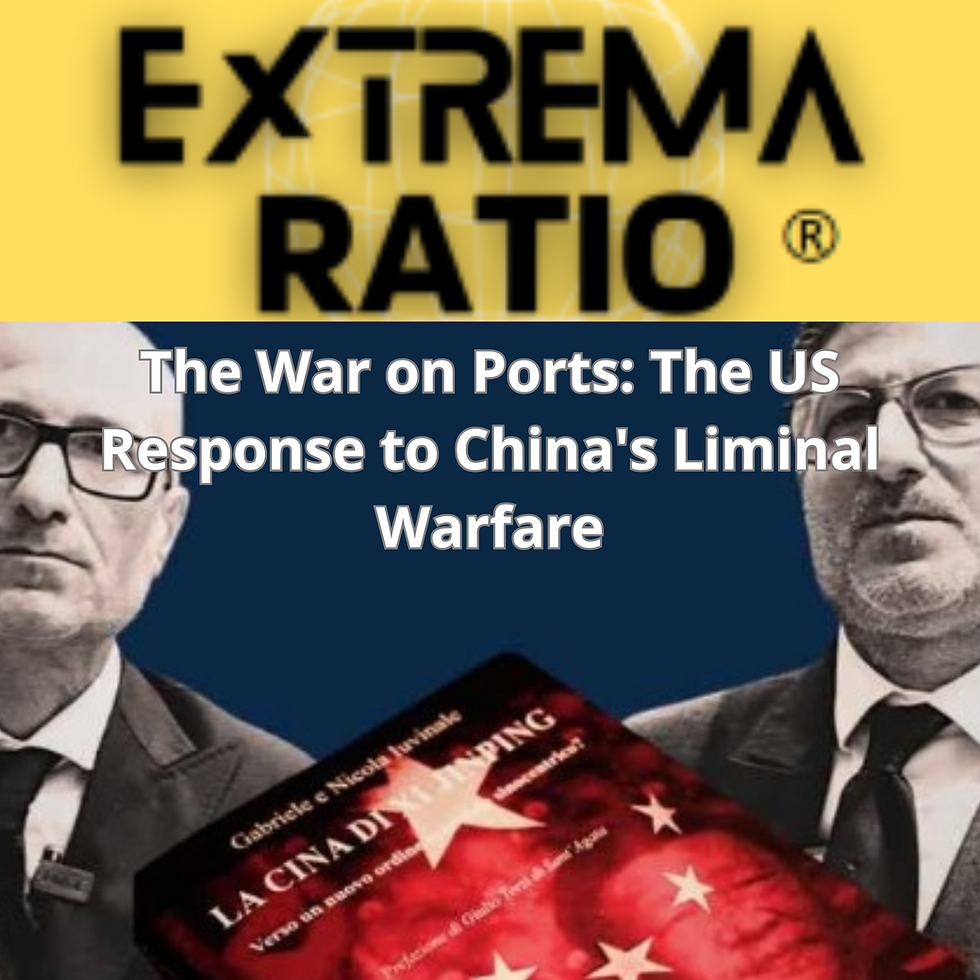The War on Ports: The US Response to China's Liminal Warfare
- Nicola Iuvinale
- 16 set 2025
- Tempo di lettura: 3 min
This article analyzes the escalating geopolitical competition between the United States and China, focusing on Washington's strategy to counteract Beijing's global maritime influence. Based on an analysis of China's Liminal Warfare and the predictions from the 2023 essay "Xi Jinping's China," the article illustrates how China uses a "civil-military fusion" to turn commercial ports and ships into strategic outposts, extending its power projection globally. It describes the risks associated with this strategy for Western countries and highlights how recent actions by the US administration to weaken China's port network confirm the Extrema Ratio analysis, demonstrating that the United States has recognized and is acting to counter a threat that extends beyond conventional conflict.
The analyses by Extrema Ratio, reported in the 2023 essay "Xi Jinping's China: Towards a New Sinocentric World Order?", have proven accurate: the United States is now implementing an aggressive strategy to counter Beijing's growing global maritime influence. What was once considered a mere economic or commercial competition is now perceived by Washington as a real "war," albeit an unconventional one, fought on the margins, in the vast realm of Liminal Warfare.
This strategic approach, first outlined by two People's Liberation Army colonels in 1999, is based on the idea that conflict is not limited to traditional military means. The goal is to gain strategic advantages through the use of "trans-military" and "non-military" tools, such as controlling critical technologies, acquiring real estate, and, most importantly, managing ports worldwide. This strategy aims to "ride the limit of observability," staying below the threshold of open warfare while laying the groundwork for eventual global hegemony.
by Gabriele and Nicola Iuvinale

From the "String of Pearls" to Civil-Military Fusion
The Belt and Road Initiative (BRI), and particularly its maritime component, is the primary vehicle for this strategy. Whoever controls maritime traffic controls the world, and China has built a global network of ports that serves a dual purpose. In 2004, Chinese military strategists developed the "String of Pearls" theory, which suggests that commercial port infrastructure can function as covert bases for ammunition depots and as support points for combat operations.
This strategy is an integral part of the broader "civil-military fusion" promoted by Beijing, as also explained in the 2015 Defense White Paper. Civilian organizations, including shipping companies and port facilities, are required to contribute to the national defense effort. An example of this is Chinese cargo ships which, according to 2015 technical standards, must be convertible for military use, or civilian ports that are already used for resupplying Chinese naval ships, as confirmed by Colonel Cao Weidong in 2013. In 2019, Chinese state-owned enterprises were managing around 70 ports outside of China, a number estimated to have risen to over 100 by 2022. In Europe, strategic ports like Euromax in Rotterdam, Antwerp in Belgium, Hamburg in Germany, Piraeus in Greece, and Vado Ligure in Italy are under Chinese control or management. COSCO alone operates over 360 container ships, the third-largest fleet in the world by capacity.
Washington's Reaction and the Risks for the West
The 2023 essay's predictions that China-controlled ports pose a significant risk to Western countries have been fully confirmed by recent US actions. The Trump administration has launched an operation to weaken China's port network, with the goal of placing strategic infrastructure under Western control. In March, the US Federal Maritime Commission launched an analysis of seven global maritime choke points, including the Strait of Gibraltar. Washington's concerns focus on critical hubs like the port of Piraeus in Greece, of which China COSCO Shipping Corporation holds 67%, the Spanish terminals in Valencia and Bilbao (where the China Ocean Shipping Group has operational rights), and the Jamaican hub of Kingston Container Terminal, where China Merchants Port Holdings holds a stake.
The United States fears that China could exploit these investments to:
Trap host countries in the event of a conflict: Forcing them to choose between facing retaliation from Beijing or its rivals.
Facilitate espionage: By turning ports into intelligence-gathering hubs for both military and commercial purposes.
Exert economic coercion: By interrupting port operations or terminating contracts during political disputes.
The US strategy, which includes supporting Western private companies, like BlackRock, in acquiring Chinese-owned port stakes, as seen in the Panama Canal, demonstrates that Washington has fully grasped the threat posed by Liminal Warfare. The goal is to limit China's ability to extend its military and intelligence power through its global port network. This move marks the beginning of a new phase in great power competition, where the battlefield is no longer just the sea, but the ports themselves.
Book:




Commenti